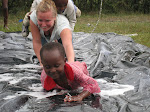Tunajifunza ... pole pole.
That means, "We're learning ... slowly."
Speaking Kiswahili every day, for me at least, has been 90 percent of the fun during our first month in Tanzania working for The Foundation For Tomorrow. No other language experience I've ever had can compare. Español has only really been needed for a few trips to Spain; Français was completely unnecessary when I was studying in Geneva; the little I tried to learn of Srpski during my six months in the former Yugoslavia was most definitely too late. Kiswahili Billy (pronounced Kee-swa-hee-lee Bee-lee), one of the many self-adorned nicknames I've accumulated this month, is an entirely different animal. Here's why:
New and Intriguing (+) Compulsory to Job Performance = The Road to Fluency. Not only am I truly a blank slate, but I've got to learn it, too.
And the locals love it when the two wazungu dudes speak their language. They love it. The amount of street cred TFFT is to have in the Arusha-Usa River stretch is going to be directly dependent upon how far Hunter and I progress with Swahili. Three of our neighbors -- Baba Juma and his two daughters, Mariam and Biti -- are handy teachers. Our tutor -- Bwana Shio -- leaves a lot to be desired. My phrase book -- a publication of the dreaded Lonely Planet -- is just flat out wrong half the time. In the end, getting it down is all about personal initiative.
I find that little kids and market vendors provide the best learning material. Kids talk about simple stuff; vendors use lots of numbers. That, and they're always intrigued by you asking questions in Swahili. You really do learn, too. Cucumber, basketball, tomatoes, shoes, garlic, "shoot the ball," etc. Hunter is only now learning to listen to me and take a little black book to write all this stuff down.
Learning the proper slang never hurts either. You throw out a "mzuka kabisa" over a plain old "nzuri" when a kid your age asks you how things are going, and you're going to be the talk of that part of the village for hours.
People fall all over themselves trying to help you learn it. When this old lady on the road today threw out some crazy greeting I'd never heard, my hesitation and confusion were so obvious that she quickly followed it up with, "Sema salama" ("Say peaceful").
"Salama."
She flashed a near-toothless smile. "Anajifunza," I hope she thought to herself. "He's learning."
---------------------------------------------------------------------------------
I will now take you on a tangent loosely related to the issue of learning Swahili: Local Nicknames.
Hunter's is easy. Ninety percent of the people who know us refer to him as Mwindaji. It's the word "Hunter" in Swahili. When people are introduced to him, they don't hear a fratty American name; they hear animal killer. It's an effective deterrent to trying to rob us.
Mwindaji, always the modest one, feels that one name is enough. I, never the modest one, need several:
- Hakuna Pwani. Literally translated as "Without Bay," which is the equivalent of Bayless. This is the original. I don't use this name often, because it is like Borat's wife -- "she's a boring."
- Hatari. It was the name of a John Wayne movie set in Arusha National Park, and it is painted all over the place in Tanzania. "Hatari" means "danger." I made one amazing shot after a behind the legs dribble and a fade away jump on the baseline one day, and after it went in, I just yelled out "Hatariiiiii!" The name has stuck with the kids on the court that day ever since, and I definitely do a lot to fan the flames by telling neighborhood kids that yes, my name is in fact "Danger." "And meet my friend, 'Slayer of Animals.'"
- Ticha BP. Tanzanian kids think every mzungu is a "teacher." In Swahili, that is spelled "ticha." The kids at Fikiria Kwanza, where Hunter and I will begin teaching next month, have a weird game called "BP" that requires everyone to write those two letters all over their hands, legs, arms, whatever. I noticed this and let them know that they were writing my initials. Ever since, they've called me "BP" or "Ticha BP," and once again, I fan the flames by introducing myself as Ticha BP.
- Billy. This is a universal "We're not from America and 'Bayless' is really difficult to say" answer. I've been called Billy by mistake by Mexicans, Germans, Jamaicans, Yugoslavs, Turks, Chinese, and now Tanzanians. One guy even got my name right a few weeks ago, and Baba Juma quickly corrected him: "His name is Beelis, not Bayless." Beelis, Billy, sawa sawa.
- Kiswahili Billy. No one has ever actually called me this. I just made it up tonight. And as a matter of fact, I'm not done with it. I think I might just condense to Kiswabili.






No comments:
Post a Comment